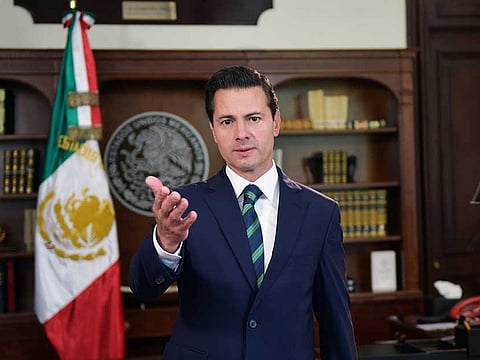Mexico’s election may leave economy in limbo
As the country’s economic chasms continue to deepen, fast-paced productivity in the Nafta-linked north leaves behind stagnating southern states

When Felipe Calderon handed the presidential sash to Enrique Pena Nieto in 2012, Mexico’s economy was just pulling out of a four-year slump. The oil sector, which covered roughly a third of the federal budget, was in decline, production down nearly 1 million barrels a day and falling fast. Monopolies and oligopolies made everyday transactions cost up to 40 per cent more than if markets were more open. Mexico’s infrastructure lagged its emerging market peers; its students languished at the bottom of developed-country rankings. And more than half of its workers toiled off the books, with few benefits or legal protections.
As Pena Nieto gets ready to hand the sash to another, growth has returned — averaging a respectable if underwhelming 2.4 per cent a year. Foreign direct investment is also back, with tens of billions of dollars pouring into autos, telecommunications and energy. But for Mexico to really change, the ambitious reform project of the last five years needs to deepen. And the government’s other failures have undermined the very model that can brighten Mexico’s economic future, making any such deepening much less likely.
Pena Nieto took on Mexico’s long-standing structural barriers to growth through the Pacto por Mexico forged by its three biggest political parties, passing nearly a dozen reforms in his first 18 months to enhance competition, extend credit, revive the energy sector, expand the tax base, and better train young Mexicans.
This ambitious project led to real wins. Mobile calls now cost less than half what they used to, and mobile broadband access has become more a norm than a luxury, subscriptions up eightfold as regulators weakened telecom mogul Carlos Slim’s grip on the market. New pipelines and processing plants have eased the gas shortages formerly facing Mexico’s industrial heartland. And several million workers have emerged from the labour shadows, their firms pushed by financial incentives, temporarily lower payroll taxes and stronger enforcement to register with the government. Millions of Mexicans have opened their first bank accounts or received their first credit cards; banks now offer more mortgages, credit lines and lending than in the past.
Yet these gains represent only a small part of what the reforms can do for Mexico. The real payoffs for consumers, companies and the economy will only happen down the road. It will take years for the $100 billion (Dh367 billion) of foreign investment in the energy sector, for instance, to staunch the long slide in production with new finds and fields, and for the transformation of the electricity grid to increase production, lower prices, and boost clean energy.
Challenges to dominant economic players and powers are just beginning: The new and fiercely independent antitrust agency Cofece has launched dozens of investigations into shipping, sugar, pharmaceuticals, airport taxis and pension managers, but the lower prices, competition and innovation from this opening are yet to come.
Changes in the classroom have barely started. A new curriculum that moves from rote memorisation to critical thinking and social and emotional learning will be rolled out only this August, with the benefits accruing to the next generation of Mexican learners.
Unfortunately, however, the country’s patience has worn thin. The government over-promised quick gains — GDP growth of 6 per cent and drastic declines in poverty — leaving many Mexicans disillusioned. Mexico’s geographic economic chasms continue to deepen, the fast-paced productivity and Asian rates of economic growth in the Nafta-linked north leaving behind the stagnating southern states. There, tens of millions of Mexicans — some 40 per cent of the population — still face entrenched poverty, as good jobs remain few, and crime and migration combine to tear apart communities.
Fiscal mismanagement and greed have further eroded public trust. Overspending every year by tens of billions of dollars, the Pena Nieto administration will leave Mexico vastly more indebted than when it started, with debt rising from a third to nearly 50 per cent of GDP. And his government spent poorly: Public investment has plummeted to its lowest relative levels since the 1940s, as almost all of this new largesse has gone to salaries and benefits or disappeared into private hands.
This administration’s profligacy and over-the-top corruption have cast a long shadow over the general economic consensus of the last 30 years. True, the second and third top candidates in the polls — respectively, Ricardo Anaya of the Frente alliance and Jose Antonio Meade of Pena’s PRI — promise to continue market-friendly policies, even in the face of a debt-constrained budget and battered credibility. Yet that could not be said of the populist who leads the polls, Andres Manuel Lopez Obrador. Champions of civil society, transparency and strong independent public institutions can derive little comfort from some of his recent pronouncements. On the stump, he offers a return to a time of business subsidies, state ownership and agricultural self-sufficiency. He repeatedly questions energy and infrastructure contracts — including those undergirding Mexico City’s new $13 billion airport — and promises to roll back the educational shifts underway.
If that happens, the as-yet-unrealised promise of faster and more inclusive growth, and of a more competitive and prosperous Mexico, could recede yet further into the future.
— Washington Post
Shannon O’Neil is a senior fellow for Latin America Studies at the Council on Foreign Relations in New York.
Sign up for the Daily Briefing
Get the latest news and updates straight to your inbox



